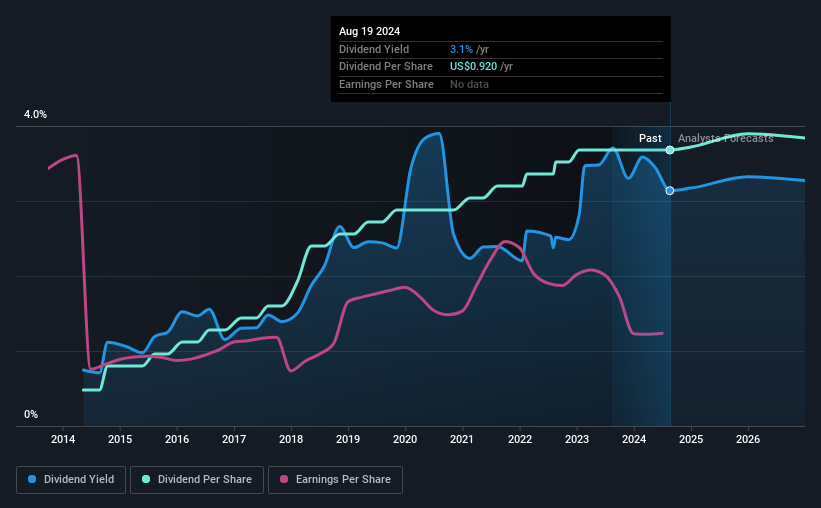
United Community Banks, Inc. (NYSE:UCB) has announced that it will be increasing its periodic dividend on the 4th of October to $0.24, which will be 4.3% higher than last year's comparable payment amount of $0.23. The payment will take the dividend yield to 3.1%, which is in line with the average for the industry.
View our latest analysis for United Community Banks
United Community Banks' Dividend Forecasted To Be Well Covered By Earnings
Solid dividend yields are great, but they only really help us if the payment is sustainable.
Having distributed dividends for at least 10 years, United Community Banks has a long history of paying out a part of its earnings to shareholders. Based on United Community Banks' last earnings report, the payout ratio is at a decent 60%, meaning that the company is able to pay out its dividend with a bit of room to spare.
Looking forward, EPS is forecast to rise by 67.7% over the next 3 years. The future payout ratio could be 39% over that time period, according to analyst estimates, which is a good look for the future of the dividend.

United Community Banks Has A Solid Track Record
The company has an extended history of paying stable dividends. The annual payment during the last 10 years was $0.12 in 2014, and the most recent fiscal year payment was $0.92. This works out to be a compound annual growth rate (CAGR) of approximately 23% a year over that time. It is good to see that there has been strong dividend growth, and that there haven't been any cuts for a long time.
Dividend Growth Is Doubtful
Some investors will be chomping at the bit to buy some of the company's stock based on its dividend history. However, things aren't all that rosy. It's not great to see that United Community Banks' earnings per share has fallen at approximately 6.8% per year over the past five years. Declining earnings will inevitably lead to the company paying a lower dividend in line with lower profits. However, the next year is actually looking up, with earnings set to rise. We would just wait until it becomes a pattern before getting too excited.
Our Thoughts On United Community Banks' Dividend
Overall, it's great to see the dividend being raised and that it is still in a sustainable range. While the payments look sustainable for now, earnings have been shrinking so the dividend could come under pressure in the future. The dividend looks okay, but there have been some issues in the past, so we would be a little bit cautious.
It's important to note that companies having a consistent dividend policy will generate greater investor confidence than those having an erratic one. However, there are other things to consider for investors when analysing stock performance. Taking the debate a bit further, we've identified 1 warning sign for United Community Banks that investors need to be conscious of moving forward. Is United Community Banks not quite the opportunity you were looking for? Why not check out our selection of top dividend stocks.
If you're looking to trade United Community Banks, open an account with the lowest-cost platform trusted by professionals, Interactive Brokers.
With clients in over 200 countries and territories, and access to 160 markets, IBKR lets you trade stocks, options, futures, forex, bonds and funds from a single integrated account.
Enjoy no hidden fees, no account minimums, and FX conversion rates as low as 0.03%, far better than what most brokers offer.
Sponsored ContentNew: AI Stock Screener & Alerts
Our new AI Stock Screener scans the market every day to uncover opportunities.
• Dividend Powerhouses (3%+ Yield)
• Undervalued Small Caps with Insider Buying
• High growth Tech and AI Companies
Or build your own from over 50 metrics.
Have feedback on this article? Concerned about the content? Get in touch with us directly. Alternatively, email editorial-team (at) simplywallst.com.
This article by Simply Wall St is general in nature. We provide commentary based on historical data and analyst forecasts only using an unbiased methodology and our articles are not intended to be financial advice. It does not constitute a recommendation to buy or sell any stock, and does not take account of your objectives, or your financial situation. We aim to bring you long-term focused analysis driven by fundamental data. Note that our analysis may not factor in the latest price-sensitive company announcements or qualitative material. Simply Wall St has no position in any stocks mentioned.
About NYSE:UCB
United Community Banks
Operates as the bank holding company for United Community Bank that provides financial products and services to commercial, retail, government, education, energy, health care, and real estate sectors in the United States.
Flawless balance sheet, undervalued and pays a dividend.


